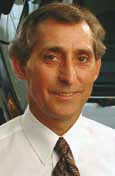Jim Salas, Ryder Systems, takes over this week as TMC chairman. (See the March 12 print edition for a profile story.)
/tr>
/table>
When this Monday-Thursday meeting ends, an era will also end. When the group next assembles, its name will be the Technology and Maintenance Council.
At the close this week, TMC Chairman William Wolterstorff of Sather Trucking will hand the gavel over to Jim Salas of Ryder Systems.
Wolterstorff said the group’s name change is an “outer sign of deeper change.”
The TMC board voted Jan. 19 to take over some activities of the now-defunct Information Technology and Logistics Council.
So TMC was asked to accept an expanded mission that would include technology services not necessarily related to maintenance issues.
“I think the tech people will be glad to see the way TMC works on problems,” Salas said in the March 12 print edition of Transport Topics newspaper.
“This was definitely the right thing,” Peggy Fisher, a tire consultant and longtime TMC member, said at the Nashville conference. “We are getting to the place where we have an electronic office in a truck. We need to be going this way.”
This week's annual meeting, held at Nashville's Opryland Hotel in conjunction with TMC's trade show, was attended by 2,420 members, associates, exhibitors and others, down from 2,953 last
ear.
Both TMC Executive Director Carl Kirk and Technical Director Robert Braswell cited a slumping economy as the reason for the drop in attendance.
But while part of the economic slump has come from tech-sector retrenchment, TMC attendees saw that maintenance and technology functions should develop together.
“Like it or not,” agreed Roy Moore of Marketing.Com, “The way of the future is in technology.” Truck cabs are going to contain a wealth of information for fleet managers and, in some cases, government regulators, he said.
“Someone is going to have to retrieve the information – from proximity sensors, from ‘black boxes,” he said. “It might as well be maintenance people.”
Less effusive than Moore was Bill Zieske of Tuthill Inc., but he offered no disagreement. “This action is not controversial,” he said, “and it could be a good thing.”
Darrell Hicks of Pennray Corp., said he has no doubts that the move benefits TMC. “I think it is a positive thing,”he said.
Duke Drinkard of Southeastern Freight Lines offered the view of a veteran maintenance chief.
“I am very much in favor of the expanded TMC mission,” he said. “It gives the group greater importance and respect,” he said.
Wolterstorff said the TMC board of directors would be expanded temporarily from 14 to 17 members.
Study groups have been named to address such issues as data interchange; automated data entry; logistics and customer transactions and voice and data communications.
However, they will not begin work until TMC’s June 11-14 meeting in Phoenix.


 Transport Topics
Transport Topics